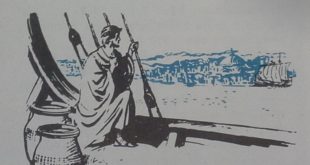Christianity was the movement that spread Across the Roman Empire Pointing the way for the rest of the ancient world toward belief in a single God. The year is 400 A.D. Andropolos paces impatiently up and down the deck of the merchant ship. He is eager to get back home; and to Andropolos, home is the city of Constantinople, a new capital of the Roman Empire. He can already see the walls and buildings of the great city shimmering in the distance. Now the ship is nearing the narrow Bosporus, the waterway where Europe and Asia are hardly a mile …
Read More »Tag Archives: Bethlehem
Great Church Fathers A.D. 340-430
IT WAS about the middle of Lent in Antioch, reported Jerome, when “a deep-seated fever fell upon my weakened body, and . . . it so wasted my unhappy frame that scarcely anything was left of me but skin and bone. Meanwhile, preparations for my funeral went on; my body grew gradually colder and the warmth of life lingered only in my throbbing breast. Suddenly I was caught up in the spirit and dragged before the judgment-seat . . .” Then follows a long account of his dream in which Christ scolded him for his devotion to the works of …
Read More »
